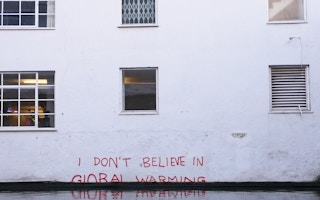‘Denial’ seems to be in the air at the moment, whether of historic or scientific fact. The advent of a US political administration replete with climate deniers, and a recent media storm based largely on falsehoods and distortions, prompted us to revisit some basics on climate change.
Is the future climate uncertain?
A lot is made of the uncertainty of climate models by those wishing to promote doubt. But a robust approach to validating climate analysis is in place – and there’s a great deal we can be certain of. For example:
- It is getting hotter and heatwaves are more common; 16 of the 17 hottest years on record have been this century, with the other one in 1998
- Rainfall is getting more intense. Already one in five extreme downpours can be attributed to climate change. Such heavy rainfall causes flooding and much human and physical damage
- Sea levels are rising, with oceans getting warmer and becoming more acidic, affecting fish stocks and undermining good nutrition, and
- Ice sheets are shrinking, affecting trade winds and creating unusual weather bubbles. Spring snow is reducing (PDF) and it is thawing earlier.
And we can be certain that the rapid climate change we are seeing is caused by humans:
- The carbon dioxide in the atmosphere is now over 400 parts per million (PDF), explained by annual emissions over 60 per cent higher than in 1990, and
- Ninety-seven per cent of scientists, and a rigorous inter-governmental review of evidence, are all certain that climate change is due to human activity. Scientists are as certain of climate change as that smoking causes lung cancer.
Climate change is ultimately an issue of equity
Basic warming figures and temperature increase projections suggest a minor impact in some countries such as the UK, but a significant impact elsewhere. In any case, it’s clear that a rise of two degrees or more above pre-industrial levels will wreak havoc with environmental and social systems throughout the world, particularly in poor countries.
Essentially the wealth of the richest nations has been built on fossil fuel emissions that cause warming. Ten per cent of people in the world are causing almost half of all emissions. If they cut their emissions to the level of an average European, global emissions would drop by a third.
But those most affected by climate change – at risk of losing their homes and their livelihoods – are mainly poor people living in poor countries (PDF), who generate less emissions and are not to blame for climate change.
What does this mean for the future?
The Least Developed Countries Group, with support from others, ensured the Paris Agreement on climate change includes the aim of staying below a 1.5C rise in temperature. Above this, many low-lying islands and drought-prone regions will no longer be viable for human settlement.
But best estimates suggest that at current rates of emission we will have used up the carbon budget that would keep us below 1.5C within a maximum of 13 years.
“
Scientists are as certain of climate change as that smoking causes lung cancer.
To stay below 2C, the wealthy countries must achieve zero net emissions by 2035 (PDF), and the poorest countries need to reach zero net emissions by 2050.
An average increase of 4C (and we are currently on track for 3-4C) would mean heatwaves in Europe and Asia, a massive decrease in water availability in many regions (particularly severe for Southern Africa), and sea level rise that will displace half a billion people. Without adequate action, an additional 100 million people will fall into extreme poverty by 2030.
Time for climate action?
This implies a huge challenge to both policymakers and individuals – particularly those of us living in richer societies. Climate action is about what we can do to reduce our own emissions as individuals and households, but also what we can do as citizens to demand urgent policy change.
Do we want our children to inherit a disastrously depleted environment, in a world of dangerous climate extremes where climate change drives growing inequality? If not – it’s time to step up our efforts.
So arm yourself with the facts and work with us to shore up ambition for climate action.
Without rapid action today, climate change will have a negative impact on all societies, and a disastrous impact on the lives and livelihoods of the poorest people.
Andrew Norton is director of IIED and Clare Shakya is director of IIED’s Climate Change research group. This post was originally published from the IIED blog.









